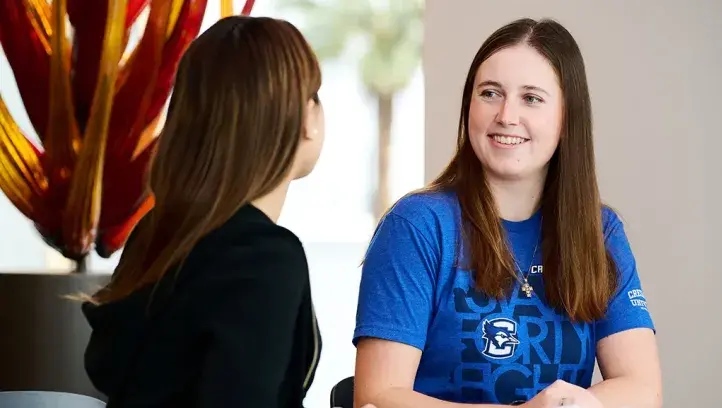
I’m Applying to Professional Schools in the Future: What Can I Do Now to Prepare?

Pursuing a career in pharmacy, occupational therapy or physical therapy requires careful planning and preparation, often beginning years before you submit your graduate school application. Whether you are a high school student exploring potential healthcare careers or a college student solidifying your professional path, taking proactive steps can significantly impact your success in the competitive health sciences admissions process.
Begin with Discernment: Is This the Right Healthcare Path?
Before diving into prerequisites and professional school applications, make sure you are pursuing the right healthcare path.
“It’s one thing to be interested in healthcare. It’s another thing to know that you want to be a physical therapist, a pharmacist or an occupational therapist,” says Mark Reedy, PhD, senior faculty director of Pre-Professional Advising at Creighton. “The applicant needs to tell their story in a way that convinces those admissions committees that this is the branch of healthcare that I’m interested in, here’s why and here’s how I know that’s what I want to do.”
Learn more about what professional school interviews are really like
Shadowing: Experience the Health Profession Firsthand
All three experts emphasized shadowing as an essential experience for prospective healthcare students. Shadowing lets you observe professionals in their work environment, providing realistic insights into your chosen health sciences field.
“Shadowing is always a good idea just to make sure that, yeah, this is really cool. This is what I want to do. Or, oh, I thought this was different. That is a good piece of data, an experience to help discern,” explains Brenda Coppard, PhD, OTR/L, FAOTA, professor of Occupational Therapy at Creighton.
Kevin Howard, director of Recruitment for Creighton’s School of Pharmacy and Health Professions (SPAHP), recommends several approaches for prospective graduate students:
- Navigate and search hospital websites for formal shadowing programs
- Ensure you meet requirements (immunizations, HIPAA certification)
- Contact standalone clinics through office managers
- Consider volunteer programs as an entry point
- Explore quality virtual shadowing opportunities
“When you have a shadowing experience, a good exercise is to journal about everything you saw that day,” Howard suggests. “What was new? What did you see that opened your eyes about the profession?” This reflection serves two purposes: it helps solidify your understanding of the profession and provides authentic content for future health professional school interviews.
Reedy also notes an important benefit of early healthcare exposure: “Our goal is for them to find the path that’s the best fit for them. And often, that is not the first path that they come in with. That’s normal. And we view that as a good thing. But it’s those in-person direct experiences, I think, that help students crystallize those decisions.”
Learn more about the importance of shadowing healthcare professionals
Understand Prerequisites Early for Health Professional Programs
Another critical preparation step is understanding the prerequisites for your health professional programs of interest, as these requirements can differ between pharmacy, physical therapy and occupational therapy schools.
“The sooner they know they’re interested in OT is to understand what the prerequisites are for Creighton’s program or if they’re going to apply to multiple programs, which often happens,” Coppard advises. “Typical pre-requisites include psychology, social sciences, anatomy and physiology, research methods and statistics, especially for the doctoral level programs.”
Reedy explains that students should “really look at prerequisite courses for different programs, and then think, okay, are these the subjects I like learning about? Do I like learning chemistry? Do I like learning biology?”
Howard clarifies important details about completing prerequisites: “If you have completed a bachelor’s degree and still have a prerequisite or two left to take, it is okay to complete those at a regionally accredited community college. Students may complete prerequisites online, including some of the science courses.”
Explore Professional Organizations and Educational Resources
Professional organizations can provide valuable resources for students exploring healthcare careers.
“Go to www.aota.org. That is our OT national professional association, and they have portions of their website dedicated to prospective students,” Coppard recommends. “They also have publications and videos and lots of things for a student to tool around in that can be very informative.”
Reedy adds, “The APTA has a very active kind of education branch within their national organization,” noting that similar resources exist for pharmacy students through their respective professional organizations.
Connect with Health Professional Schools Early
When should you start contacting graduate healthcare programs? Experts agree that the earlier, the better, especially after confirming your interest in a specific health profession.
“As you start solidifying, maybe freshman or sophomore year, PT seems to be it for me, or OT is where I want to go. Then we would welcome a student to make either a virtual or in-person admissions advising session,” explains Howard. “We could start discussing the experiences and attributes that lead to becoming a competitive applicant. And how the admission requirements and preferences can enable candidates to put their best foot forward.”
Reedy adds that the first year of undergraduate study is “a good time for students to reach out to professional schools, generally speaking, for more information. They can find out when those professional schools have open houses, where they will have alumni or faculty who are clinical practitioners available to talk to students about their experiences.”
Coppard notes that some programs offer early assurance options: “At Creighton, we have an early assurance program, and they come in as a freshman identifying that I want to be an OT. And then the pre-OT admissions counselor makes sure they’re on the right program or path to cover all their prerequisites.”
Consider Financial Planning for Graduate Health Education
Professional healthcare education represents a significant investment. Early planning for this aspect is essential.
“A high-quality and comprehensive education is a primary driver. That’s fundamental for many, but the financial cost of this education is nearly equally important,” Howard explains. “How am I going to finance this? What are some specifics around scholarship support and accessing low-interest loans to fund this education is a major driver in making the final decision.”
He recommends that students apply to schools on their shortlist to understand specific scholarship opportunities: “If a prospective student applies and is offered admission, they have not committed to attend at that point. However, it allows us to tell you specifically how much scholarship we can give you based on your lived experience and journey.”
Leverage Campus Resources for Pre-Health Students
Don’t overlook the resources available on your current campus as you prepare for graduate health programs.
“There is a course that I teach in the spring. Most of the students are first-year students, but it’s OTD 102, and it’s called Exploring Occupational Therapy as a Career,” Dr. Coppard mentions, “Creighton also has a pre-occupational therapy club. It’s one of the student organizations that students can join.”
Reedy highlights the value of pre-health advisors: “Really be comfortable to go to your pre-health advisor and just make sure that you’re on the right track with prerequisites. I think I see this a lot with first-year students. They’re worried. They don’t want to go into their advisor’s office, or they might think, I’ll look it up on the website. And there is a real, live person ready to help them.”
Howard adds, “We offer a few different options to meet directly with prospective students, and we would welcome a student as soon as they feel ready. However, it doesn’t hurt to take time and get established at the institution you’re attending. Even taking the first year of college to find your footing. Connect with the Pre-Health Advising Office.”
The Motivation Factor for Health Professional School Success
Perhaps most importantly, early exploration and discernment can fuel your motivation throughout your undergraduate studies as you prepare for a health profession.
“The earlier students can get some of those experiences that help with that discernment, not only does it help them get to where they want to go quicker, but I think it increases their motivation to do the things they need to do to be competitive,” Reedy explains. “Students will do their best work when they’re motivated by the end goal. And so, getting that discernment done early really helps with that.”
Coppard agrees: “As a parent of a college student right now, the sooner you can make that discernment, maybe in high school, the better because you might be able to shave off a semester, two semesters, whatever it might be, from your tuition bill if you went through that discernment process.”
Final Thoughts on Health Professional School Preparation
Preparing for a career in pharmacy, occupational therapy or physical therapy is a journey that benefits from early planning. By shadowing healthcare professionals, understanding prerequisites, connecting with graduate health schools and utilizing available resources, you can make informed decisions about your future and position yourself for success in the health sciences.
As Howard concludes, “We’re rooting for you. We want you to get into your dream school. We would love for you to come to Creighton, but most of the information we’re sharing with you truly applies to OT, PT, or pharmacy admission in general.”
Taking these preparatory steps now can help ensure you are ready to apply to a health professional school, regardless of which institution you ultimately choose.




